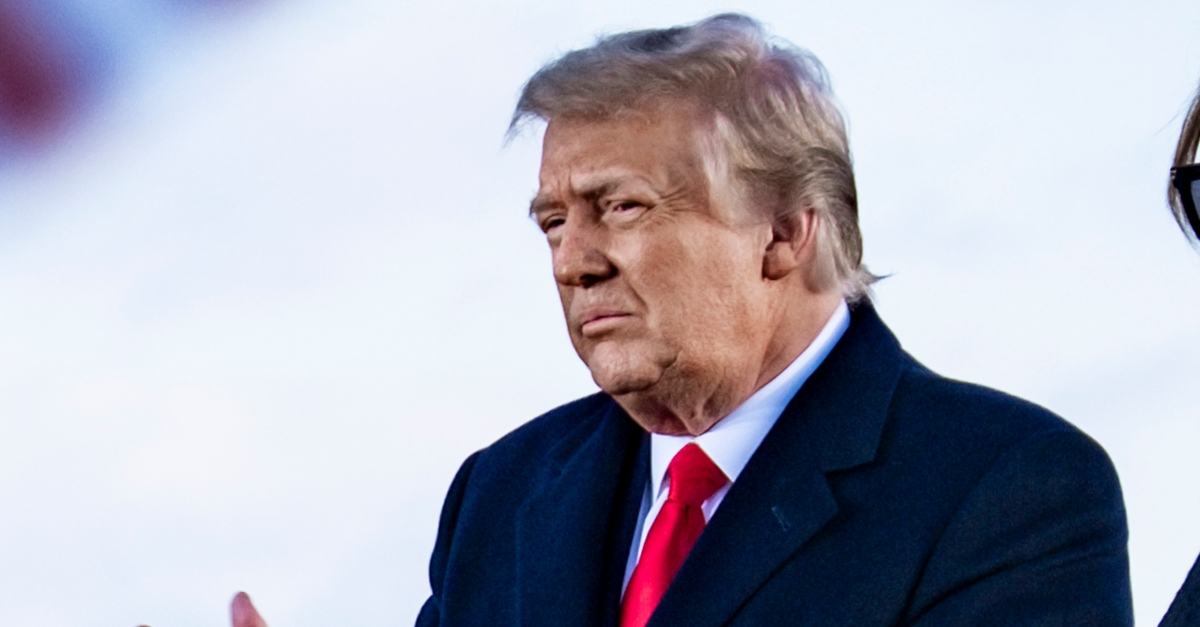
After a federal judge reminded him “Presidents are not kings,” an appellate court reminded Donald Trump that “we have one president at a time,” but the 45th president of the United States and his lawyers do not appear to be discouraged.
In a 195-page petition filed on Thursday, Trump’s attorney Jesse Binnall sought Supreme Court intervention to prevent the House Select Committee to Investigate the Jan. 6th Attack on the U.S. Capitol from enforcing a wide-ranging subpoena scrutinizing his alleged culpability for deadly siege.
On Oct. 18, Trump sued the Jan. 6th Committee, its chairman Rep. Bennie Thompson (D-Miss.), the National Archives and Records Administration, and its archivist David Ferriero, asserting various privileges over the sought-after files. Trump asserted executive privilege over 770 pages of documents, including 46 pages of records from the files of former chief of staff Mark Meadows, ex-senior adviser Stephen Miller, and ex-deputy counsel Patrick Philbin, according to court filings.
Trump also reportedly opposed releasing the White House Daily Diary and a call log between him and then-Vice President Mike Pence concerning Jan. 6.
No court that has heard that lawsuit today found much substance in Trump’s claim that he could assert executive privilege as a former president, even after his successor Joe Biden rejected that assertion.
U.S. District Judge Tanya Chutkan scoffed at Trump’s contention that scrutiny of the Jan. 6th attacks lacked legislative purpose.
“That is literally Congress’s house,” Chutkan told Trump’s counsel Justin Clark on Nov. 4, referring to the U.S. Capitol.
Though Chutkan characterized the subpoenas as “alarmingly” and “unbelievably” broad, she added that the separation of powers keep her from intruding upon a lawful exercise of power by a co-equal branch of government.
Urging the Supreme Court to overturn the lower courts’ rulings, Binnall and Clark argued that the decisions “lack any limiting principle.”
“Moreover, the decisions below effectively gut the ability of former Presidents to maintain executive privilege over the objection of an incumbent, who is often (as is the case here) a political rival,” they wrote. “These are profoundly serious issues the Court should resolve.”
With midterm elections looming in November 2022, Republicans—with few notable exceptions—have opposed the committee’s work. The Jan. 6 committee has expressed urgency in concluding their inquiry quickly, and Trump’s attorneys claim that the Supreme Court could hear the case efficiently.
“While the Committee has argued that its work is pressing and time sensitive, the fast paced nature of this litigation allows the Court to resolve the case expeditiously,” Trump’s petition states. “Indeed, it could be argued this term, should the Court’s docket allow.”
Since Trump first filed his lawsuit, the committee’s investigation has progressed in ways putting the former president and his associates in increasing legal jeopardy. Trump’s ex-chief strategist Steve Bannon faces two federal criminal charges for contempt of Congress and will face trial in July. The committee’s vice chair, Rep. Liz Cheney (R-Wyo.), recently questioned whether Trump himself may have committed acts that sounded curiously similar to a felony federal statute.
“Did Donald Trump, through action or inaction, corruptly seek to obstruct or impede Congress’s official proceeding to count electoral votes?” Cheney asked earlier this month.
The words echoed the language of the federal obstruction statute, and Trump-appointed U.S. District Judge Dabney Friedrich had recently upheld its use against Jan. 6th defendants at the time Cheney invoked its language.
(Photo by Pete Marovich for The New York Times)